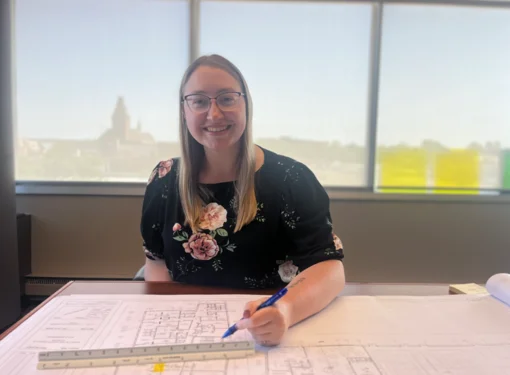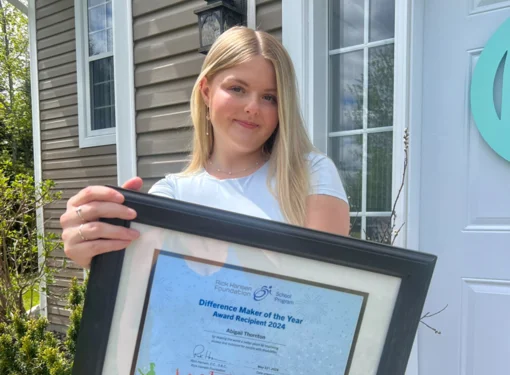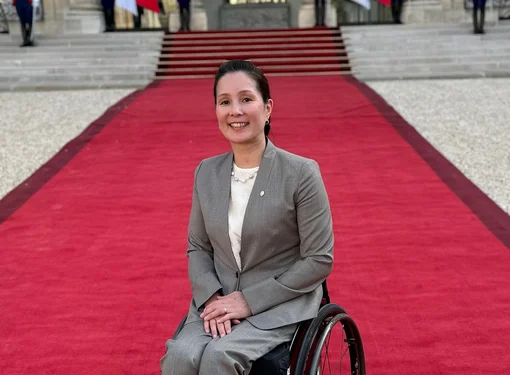Ambassador Spotlight: Matt Kinnie
While Matt Kinnie was studying engineering at the University of New Brunswick (UNB) he was injured in a rock-climbing accident that left him requiring the use of a wheelchair. His life has changed a lot since then, and not just because of his injury. He went on to become an environmental engineer, a father, changed careers, and started training for the Paralympics.
If he didn’t already have a full resume, he is also an RHF Ambassador, sharing his personal journey with others, putting a face to disability and demonstrating the importance of accessibility.

Humanizing Universal Design
This past year Matt returned to his alma mater to speak to second-year engineering students in a universal design class. He shared his encounters with inaccessible design and what that says to a person who has a physical disability, explaining why universal design matters so much.
As an engineer who also has the lived experience of a mobility disability, he was the perfect person to put their subject matter into perspective, providing very real examples of the impact of their work. “I know a lot about what happens behind the scenes and why there is so much bad design that persists out there,” he says.
Connecting with Students
One student in particular really connected with Matt’s presentation and came up to him to personally thank him after. Even though she didn’t have a disability, the presentation strongly resonated with her as one of the few women in the engineering program. Feeling like the odd one out was something she could relate to, and they fell into conversation about adapting to industries that are male-dominated and geared toward those without physical challenges.
“I told her that for the first little while I tried to adapt myself to these situations, but eventually I needed to learn how to just make it my own and not feel bad for who I was. I could see how she would feel that way as a woman working in engineering,” says Matt. “But you never have to feel bad for who you are. I probably spent the first 9 years after my injury feeling this way—it was only in the last few years where I had a breakthrough moment where I stopped feeling guilty for being a disabled engineer.”
Getting Real: Mental Health and Disability
Students also appreciated Matt’s vulnerability when he shared his struggles with mental health. About 6 years after his injury Matt encountered a challenging emotional period. “When all the dust settled and everything was really calm and routine. That’s when the rails really fell off for me.”
It would be easy to assume that potential challenges with mental health would happen immediately after an accident, but Matt was just focused on recovering, going to rehab, and getting a job. It turned out that he never really dealt with all of the complicated emotions that came with being injured. It was only when the pressure to adapt and succeed dissipated, that he was finally able to engage with the tough emotions that come with a traumatic event. Matt is now in a place he feels really good about, and is honest about the challenges he’s overcome because he knows everyone’s emotional journey can be unpredictable. He also knows that sharing his story could help someone else going through a dark time.
Accessibility is for Everyone
In his presentations, Matt likes to point out that he’s not the only who benefits from his accessible home. “You know the people who really notice it when they come over? Mothers with new babies and their strollers, because they can wheel their sleeping babies right into my house and they don’t have to take them out of the stroller and wake them up.”
His home also ensured their whole family could be together for their annual get-togethers. After experiencing a stroke, his wife’s great-uncle struggled with mobility. Because their place has a barrier free entrance and an accessible washroom, he was able to easily join in and spend time with the rest of the family.

Making time for what Matters
While Matt loved his engineering job, he recently jumped at the chance to make a change. Now he works for a medical supply company and has a schedule that allows him to pick his kids up from school every day. It’s also allows him to spend more time cycling—an important thing considering he’s part of the national team and trying to go to the Paralympics.
The extra time will also allow him to continue sharing his story. He’ll be returning to UNB next year to talk to the next cohort of universal design students, reminding future engineers who they’re designing for.






